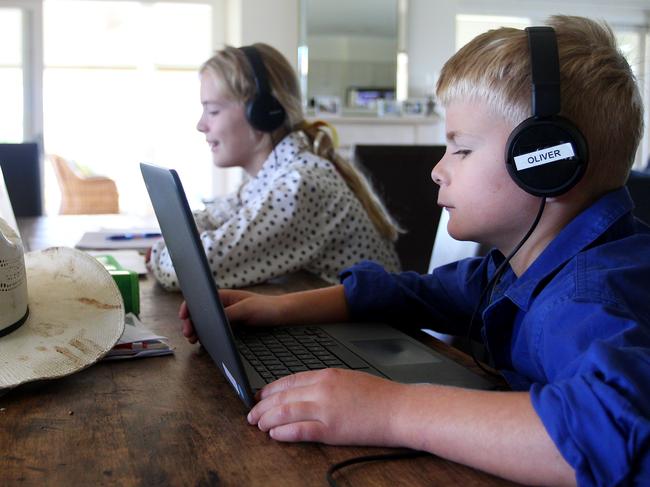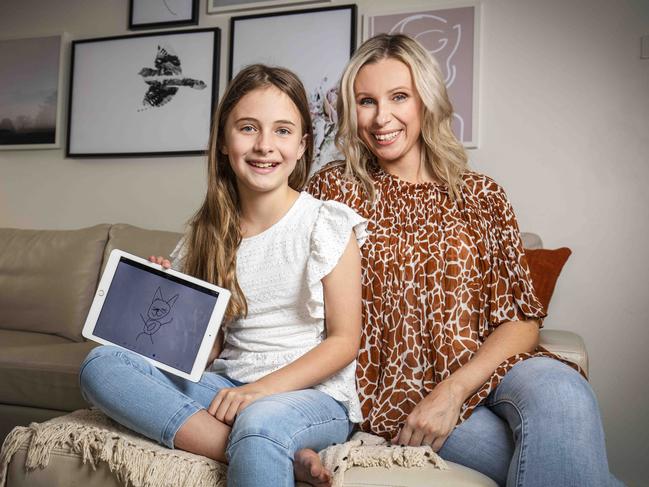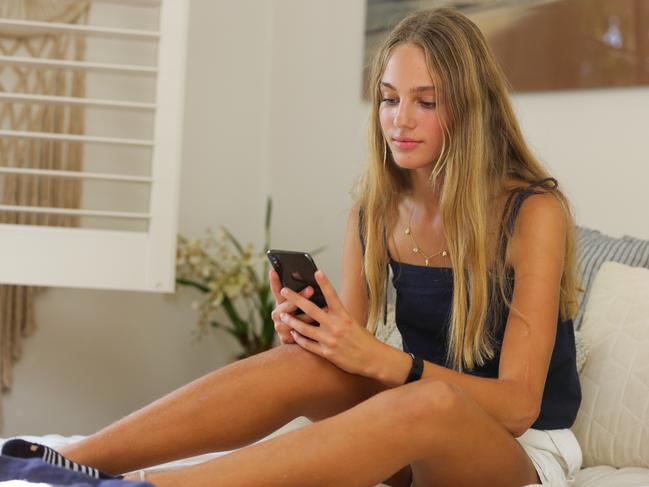Teen ‘zoom’ video calls like sitting in front of a mirror, expert and parents warn
The mean girls culture is “alive and well” amid the coronavirus pandemic with ‘zoom’ calls bringing up a new brand of bullying.
National
Don't miss out on the headlines from National. Followed categories will be added to My News.
The ‘zoom effect’ is triggering a whole new form of body shaming with tweens and teen primping prior to video chats and psychologists are likening it to sitting in front of a mirror for extended periods of time.
While boys are rushing to make sure their backdrop is perfect and their hair is just right, girls are doing their make up in the middle of the night before posting videos and worrying about lightening and angles in their video calls.
At the same time cyber bullying and sexting is on the rise with the internet now the only form of social connection.
Danni Rowlands, National Manager Prevention Services from The Butterfly Foundation, said video calling was prompting a new strain of self-esteem issues in the coronavirus crisis.
“For anyone using video calling platforms during these challenging times, body dissatisfaction may be a very real outcome,” she said.
“The experience of video calling could be likened to sitting in front of a mirror for an extended period of time and this behaviour at the best of times can increase body and appearance checking, critiquing or criticising.”
For teens and tweens, who often live out their digital lives on social media where images can be carefully curated, live video calls are suddenly thrusting them into an area which does not have the social media props they are used to.

“For people who typically engage in a high level of grooming, use online filters or take many shots before uploading the ‘perfect’ one – the live video feature may cause people to feel really uncomfortable or unhappy with how they look,” Ms Rowlands said.
The sudden dominance of video calling is creating a rise in body and appearance comparisons as well as increasing teasing around appearance and negative body or appearance chat or ‘fat talk’.
It is not just self-esteem issues which are surfacing as problems, image-based abuse like sexting and cyber bullying are also on the rise and eSafety commissioner Julie Inman Grant said cyber-bullying complaints during March were more than 20 per cent higher than the weekly average over the previous 12 months.
This can include things like sexting, abusive texts and emails; hurtful messages, images or videos; imitating people, excluding others online, and spreading nasty online gossip and chat.
MORE NEWS
Massive Aussie waitlists grow for comfort pets
Will COVID-19 be an Aussie-China deal breaker?
War movies that will change your life
Ms Inman Grant said she was aware of cases of young girls ‘tik toking’ into the night with a full face of makeup and girls bullying other girls with an extension of the conflict which usually occurred on school grounds.
“Making mean comments and creating drama,” she said.
“The school uniform is a great leveller so all of a sudden you have a situation where it is opening up a whole new window and friends can see into maybe the shabby background of their home, it has elevated some of these disparities and made them more visible.
“It can be tough for teens today to try and live up to the curated versions they create of their ‘rock star selves’ or to feel that they have to live up to unrealistic or airbrushed expectations.”
One mother told News Corp her teen girls were spending hours on their makeup before zoom calls and arranging their room for the perfect background.
“It’s the only time they clean their bedroom,” she said. “And it is incredibly bitchy. Bitchiness is alive and well, and even more so because they are locked up in houses.”
“It’s very shallow and really damaging.”
At the other end of the spectrum are the teens who are missing out on social connections because they are resisting having friends see them on screen.
“They don’t want to be seen on camera because they feels like they look bloated and doesn’t like her facial expressions, and another teenager told me she just doesn’t feel comfortable and making phone calls or texting or messaging is about as much as they are prepared to do,” Dr Kimberley O’Brien, Principal Child Psychologist at The Quirky Kid Clinic, said.

Specialist in teens and tweens psychologist Michelle Mitchell said girls are not just overly conscious of what they look like – but also what they say.
“Mean girls aren’t on holidays and nor are our teens feeling of insecurity,” she said.
Melbourne mum and blogger Cat Matthews said she put a number of restrictions in place to prevent her nine-year-old daughter from getting too obsessed with her video image.
“You can get rid of the picture so it is not like they are staring into a mirror. We minimise the camera and make sure we don’t use the ‘House party app’ where they can see themselves,” she said.
“We also make sure we put it on the whiteboard setting on Zoom so her and friends are playing games and being interactive rather than just staring at their own faces.”

Sydney mother Jane McFadden said she worries for her daughters.
“Video conferencing is terrific for allowing our children to connect with one another however, I think it’s naive to think there may be no chance of any potential long term impacts of this on impressionable young minds,” she said.
“Of course we don’t want to deprive them of seeing their friends – it’s so important for their wellbeing. However how much is too much in the long run? How will the move to them being more aware and critical of their appearance at a young age effect them in later life.
“As a mother to a nine-year-old girl, I’m conscious that this is one of the first times she will regularly see what she looks like when she interacts with her friends … from how her nose crinkles when she laughs out loud to what her resting face is and how her hair falls.
MORE NEWS
Wuhan scientists ‘did crazy things’ in lab
How Aussie drones could stop COVID-19 spreading
The Aussie restrictions expected to be lifted last
“Up until now, we haven’t had the need to use video calls apart from the odd Skype to family who live interstate, which was always deemed as a novelty and lasted no more than 10 minutes.
“Now, the calls are daily and can last for 30 mins if not considerably more as it’s the only way they can connect with their friends.
“My daughter has commented that her best friend has started to say she doesn’t like what she sees on camera and has started brushing her hair during their calls – my daughter has said; don’t worry, it’s OK if your hair isn’t perfect however, the fact that they’re having these conversations is a little unsettling.
“We’re trying to encourage our daughters to enjoy a mix of old and new ways of communication.”
Visit esafety.gov.au for more information on cyber-bullying.
